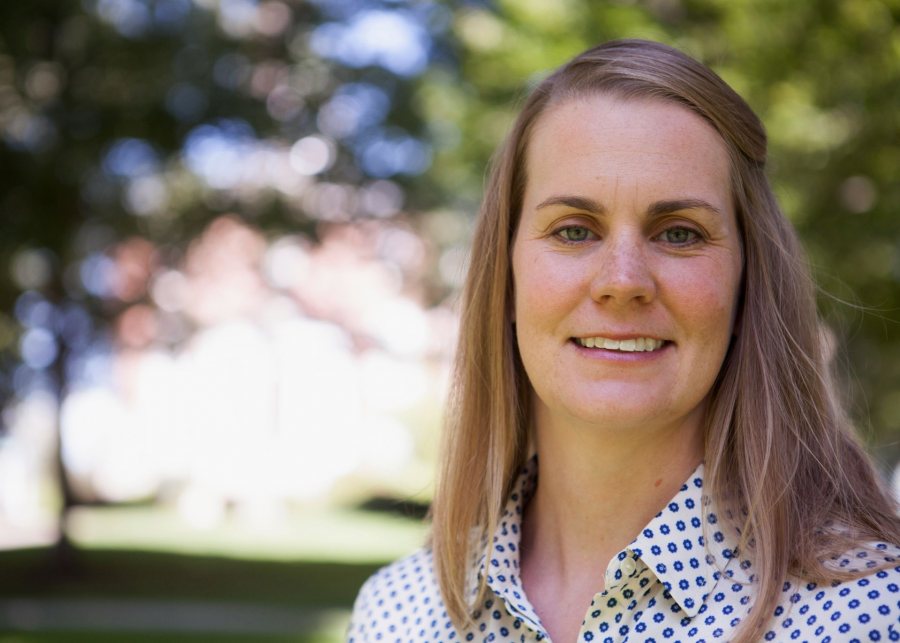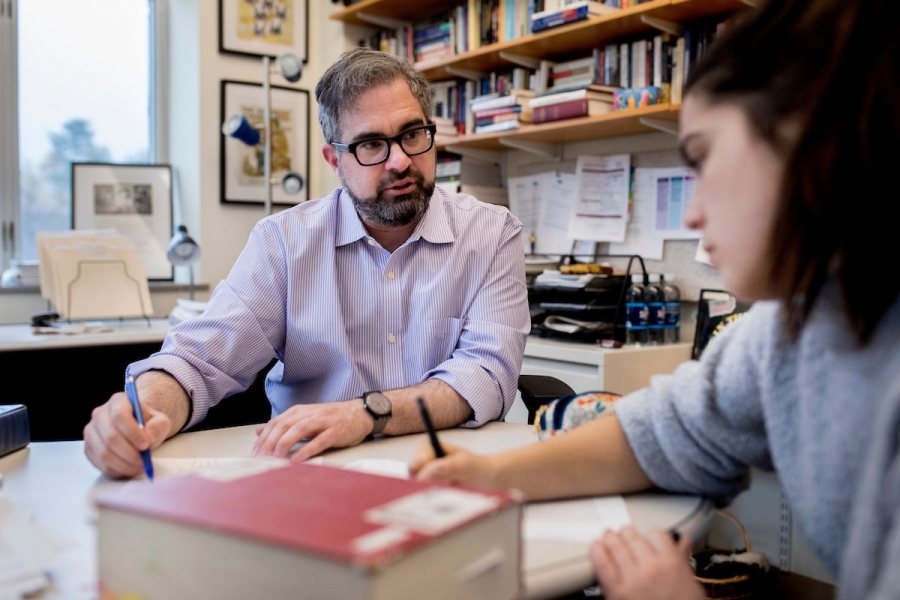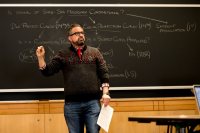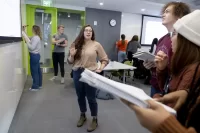
Bates has announced eight faculty promotions, including tenure awards and full professorships, effective Aug. 1 for the 2018–19 academic year.
The promotions were recommended by the faculty’s Committee on Personnel and approved by the Bates College Board of Trustees.
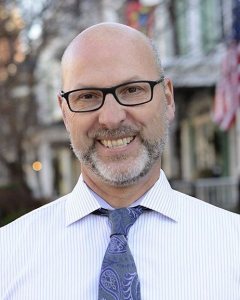
Malcolm Hill is vice president for academic affairs and dean of the faculty at Bates College.
“One of the joys of working at Bates is to be surrounded by exceptionally talented and creative people. This year’s tenured and promoted faculty provide outstanding examples of the consequential scholarship and creative work going on at Bates,” said Malcolm Hill, vice president for academic affairs and dean of the faculty.
“As leaders in their respective fields and through their continuing hard work, these faculty offer our students unparalleled opportunities in the classroom, and give us all an opportunity to engage with the important ideas of our time.”
Meet the eight newly promoted professors, learn their research fields, and discover why they teach.
Promotions to associate professor with tenure
+Associate Professor of Religious Studies Ali Humayun Akhtar
Bates academic programs: Religious Studies; Asian Studies; Classical and Medieval Studies
Appointment year: 2012
Doctoral institution: New York University
Fields of research: World history, international affairs, intersections of law and society, comparative religion, gender studies, international development, Middle Eastern and North African studies, Asian studies
Why I teach: Bates students are among the most creative and talented students I’ve taught in my career as a professor, and it’s been rewarding to empower them with the analytical, research, and leadership skills that have helped them excel after graduation.
The students and I both learn in the classroom, because I make sure they build the confidence necessary to think independently while working collaboratively. With the help of multimedia technology, field trips, and interdisciplinary assignments, I’ve ensured that my classroom offers students a global cultural experience where they can study the sights, sounds, and ideas that shape the modern world.
The combination of American and international students at Bates, including scholar-athletes from all corners of the Earth, has enriched these conversations and has even propelled my own research on international development and global affairs.
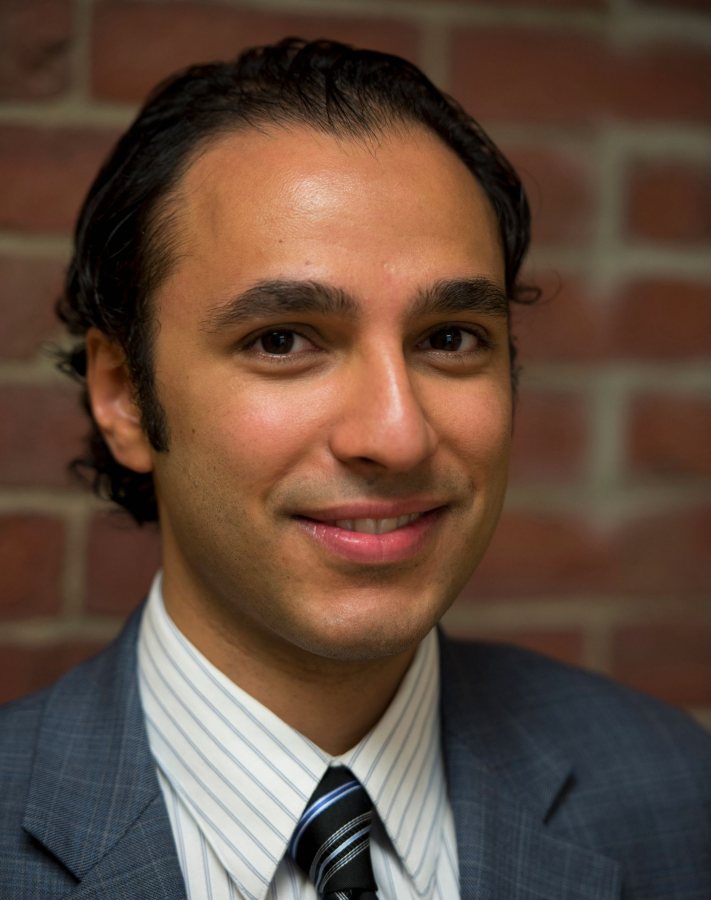
Ali Humayun Akhtar has been promoted to associate professor of religious studies. (Michael Bradley/Bates College)
+Associate Professor of Rhetoric, Film, and Screen Studies Jonathan Cavallero
Bates academic program: Rhetoric, Film, and Screen Studies
Appointment year: 2013
Doctoral institution: Indiana University Bloomington
Fields of research: Race, ethnicity, and media (especially Italian Americans); film and television history; film festivals; Bollywood; U.S. cultural history; multiculturalism and pedagogy
Why I teach: Teaching is the most fulfilling profession I can imagine. On a daily basis, I get to witness some pretty amazing things: the excitement of coming up with new ideas and courses, the joy of sharing them with students, and the ways in-class discussions form new communities.
I love interacting with students, especially when the conversations we have challenge me to think differently about film, television, teaching, politics, or life. I learn so much from my students, and I love playing a small role in helping them to achieve their goals and realize their dreams.
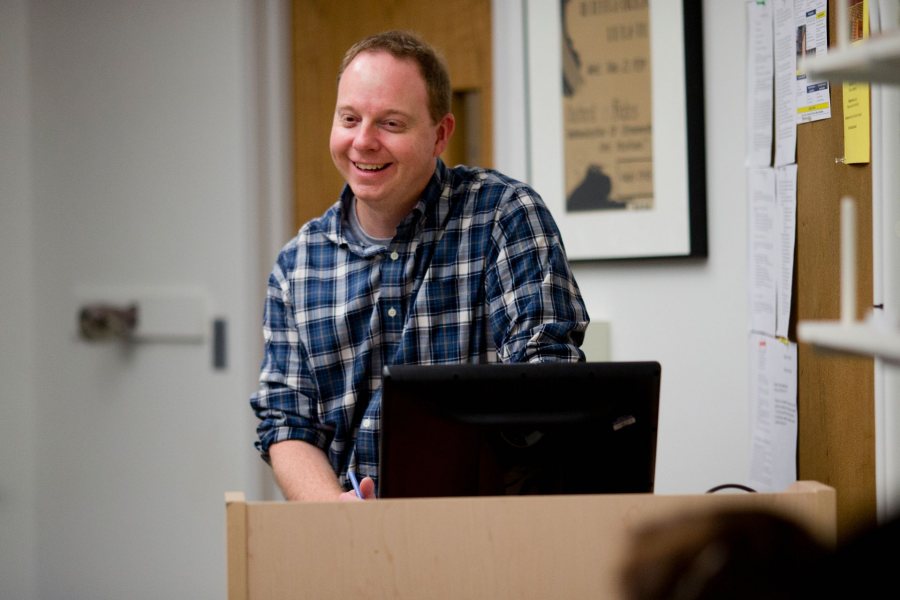
Jonathan Cavallero has been promoted to associate professor of rhetoric, film, and screen studies. (Phyllis Graber Jensen/Bates College)
+Associate Professor of German Raluca Cernahoschi
Bates academic programs: German; European Studies
Appointment year: 2009
Doctoral institution: University of British Columbia
Fields of research: German and East-Central European literature and film, literatures and cultures of the Austro-Hungarian Empire, poetry, film adaptation, literary geography
Why I teach: The principles that are the foundation of a liberal arts education guide me as a teacher every day: the application of rigor in the pursuit of our passions, the willingness to invest of ourselves that creates a community, the curiosity to expand our experiences beyond the tried and safe, the openness to different points of view and different approaches.
I aim to challenge students to reach a new level of understanding of the material, the world, and themselves. The first part of this aim connects directly to the introduction of new subject matter, be it linguistic, cultural, theoretical, or historical. The second part has as its goal student self-evaluation within historical or cultural contexts, as receivers and producers of knowledge, or in relation to other perspectives on a given subject.
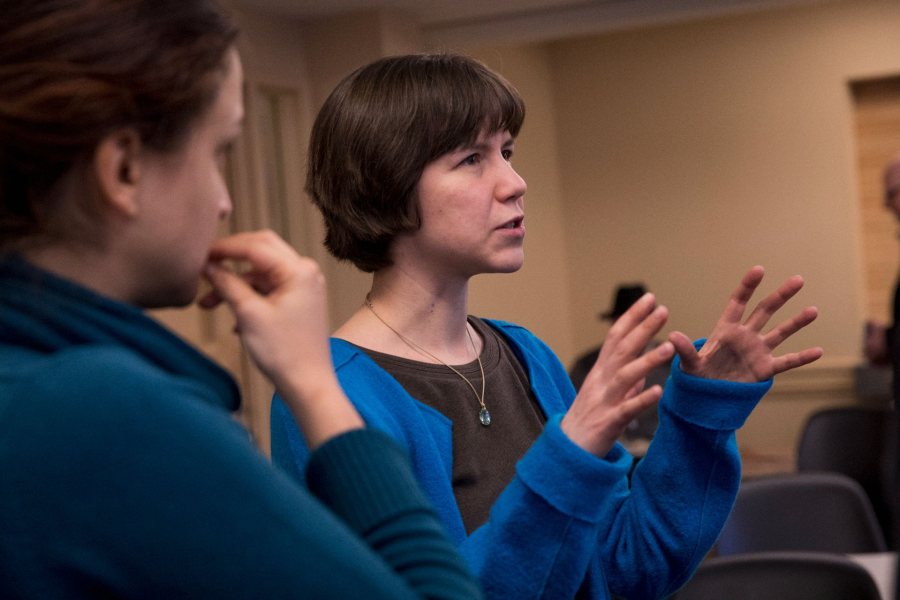
Raluca Cernahoschi has been promoted to associate professor of German. (Phyllis Graber Jensen/Bates College)
+Associate Professor of German Jakub Kazecki
Bates academic programs: German; European Studies
Appointment year: 2012
Doctoral institution: University of British Columbia
Fields of research: 20th-century German literature; literature about the First World War; images of German-Polish relationships in literature, film and visual arts; laughter and comedy
Why I teach: I want to help my students make connections between literature and their own experience. Even if the connections are not visible to my students at first reading, the discovery of such links in class discussions leads to the pleasure of the text. For me, the moments of reading together an older text, and helping them to realize its relevance, is a rush of adrenaline — it’s addictive.
This joy of discovery creates a fundament on which I can build the understanding of the work’s idiosyncrasies in a given historical context. I can then better develop the students’ awareness of the language: When they understand what the ideas are, they show a keen interest in how these ideas are expressed.
For this reason, teaching literature and culture of the German-speaking world is for me a vital step in challenging the conventional concept of “foreign” and an invitation to a further study of the language.
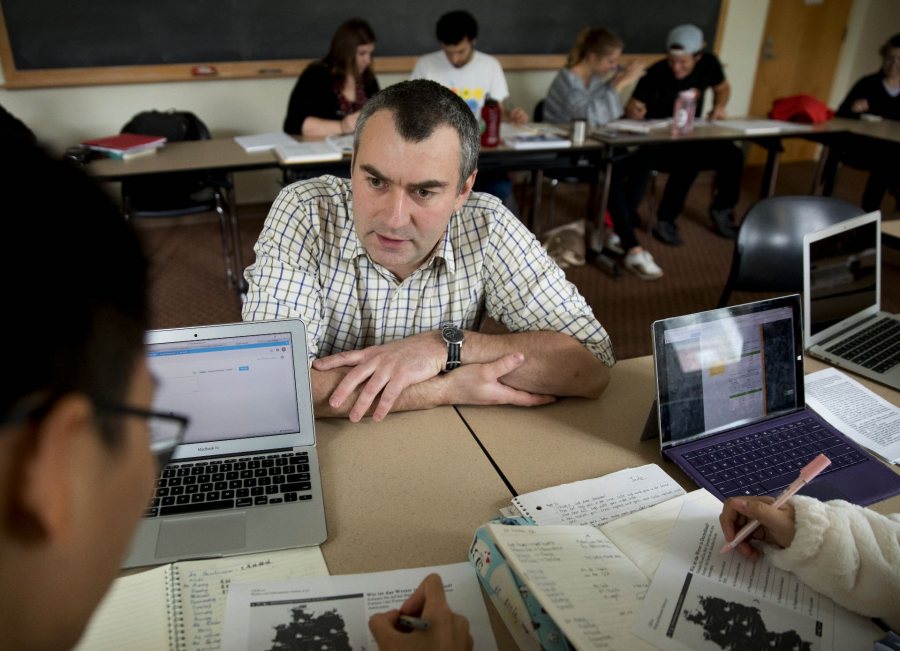
Jakub Kazecki has been promoted to associate professor of German. (Phyllis Graber Jensen/Bates College)
+Associate Professor of Mathematics Katharine Ott
Bates academic programs: Mathematics
Appointment year: 2014
Doctoral institution: University of Virginia
Fields of research: Real analysis, harmonic analysis, partial differential equations
Why I teach: I love teaching mathematics in a liberal arts setting because I can engage with students to explore both theoretical and applied aspects of math.
Students at Bates study math for a wide array of reasons, and getting to know individuals along with their varied interests makes every class unique.
My favorite moments happen when students move beyond the memorization of formulas and definitions to create ideas and to prove theorems. In classes ranging from calculus to electives and seminars, I enjoy incorporating mathematical software to aide with computations. It is rewarding to watch students gain confidence in programming and to explore technology alongside mathematical theory.
+Associate Professor of Biology Larissa Williams
Bates academic programs: Biology
Appointment year: 2012
Doctoral institution: North Carolina State University
Fields of research: Biological importance of genetic variation, cellular and molecular responses to toxicants
Why I teach: I have been curious about the world all my life, and biology as an academic field lends itself to an unlimited number of questions to be asked and explored.
It is a privilege every day to cultivate curiosity in my students. I especially enjoy the variety of settings in which I am able to teach: the classroom, in my research lab, or in places as remote as the Galápagos Islands. Each setting brings with it new opportunities and challenges to explore the underpinnings of the natural world.
I also delight in the personal relationships that are forged between professors and students at small colleges. As an alumna of a small college that benefited from such connections, I feel as though I am able to pay it forward in my job. It is a wonderfully fulfilling feeling to make a difference in a student’s life.
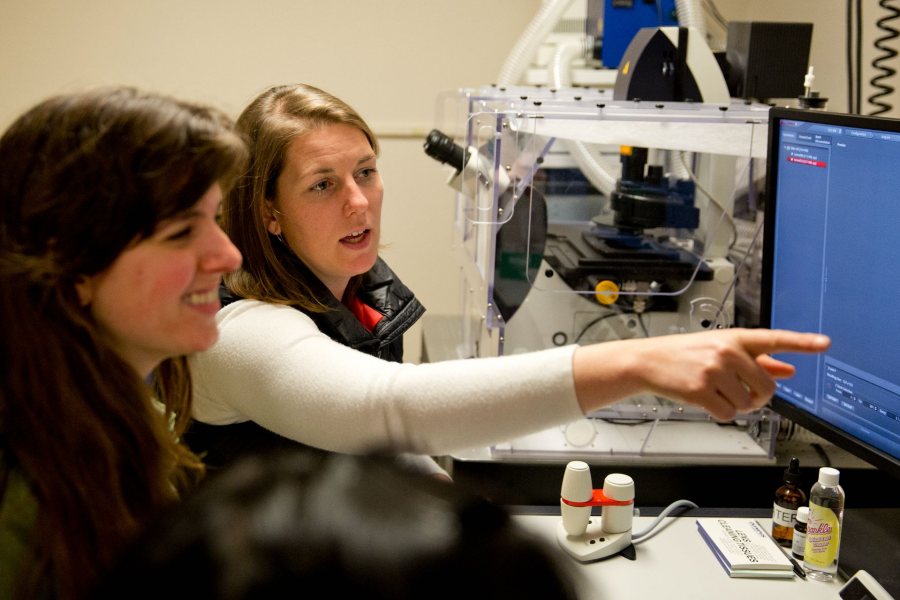
Larissa Williams has been promoted to associate professor of biology. (Phyllis Graber Jensen/Bates College)
Promotions to full professor
+Professor of Politics Stephen Engel
Bates academic programs: Politics; Gender and Sexuality Studies
Appointment year: 2011
Doctoral institution: Yale University
Fields of research: American political development; U.S. constitutional law; and social movements, particularly LGBTQ sociopolitical and legal mobilization
Why I teach: It has always been important that we, as a faculty, foster learning environments that are nurturing and challenging.
For me, the classroom has to be a place where ideas are challenged and where students must be empowered to rise to the occasion of testing new ideas and taking risks. I am always considering how we can best achieve this, particularly when we work with students who have not yet participated in that kind of educational setting.
The classroom is where I can test ideas, challenge students, and have students challenge me and one another about those ideas. It’s where together we can really think through, in the context of politics, how contemporary policy disputes, constitutional controversies, and unconventional ideas can be understood both in the moment and in the historical context.
+Professor of Classical and Medieval Studies Lisa Maurizio
Bates academic program: Classical and Medieval Studies
Appointment year: 1999
Doctoral institution: Princeton University
Fields of research: Greek and Roman mythology; Greek poetry and religious practices in archaic and classical Greece; Delphic divination.
Why I teach:
If you were religious folk,
how would your dramas justify
unmerited suffering?
By what myths would your priests account
for the hurricanes that come
twice every twenty-four hours,
each time I dress or undress…?
So wrote the poet and classicist W.H. Auden, who turned to the ancient Greeks to ask big questions, such as how we understand and justify unmerited suffering. I study the myths and religious practices of the Greeks not because they provide the best answers to these big questions, but because the Greeks in their poetry and on their temple walls offer answers that are beautiful and mysterious and harsh.
When my students and I engage with the Greeks over shared questions, time slips away. On these journeys to the past amid the chaos and sorrows of the present, we are teaching each other the language of our souls and fortifying ourselves for the future.
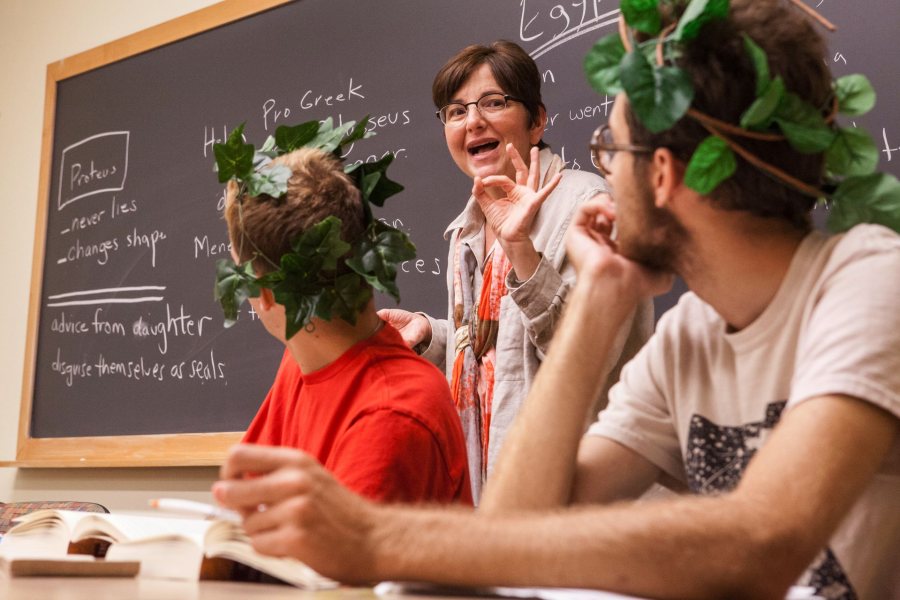
Lisa Maurizio has been promoted to professor of classical and medieval studies. (Phyllis Graber Jensen/Bates College)
